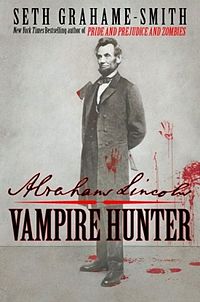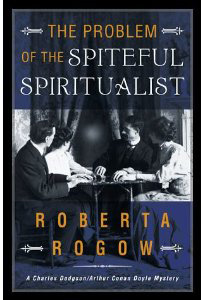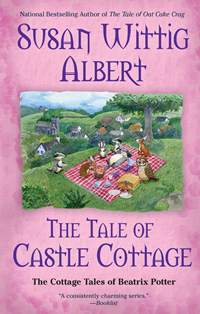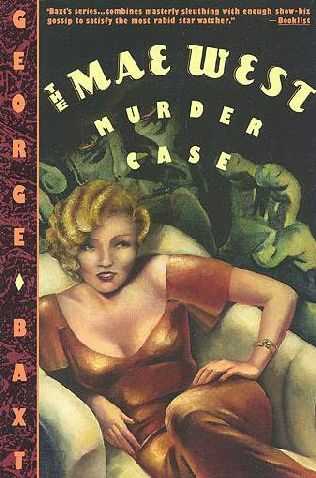 Sitting in the movie theatre waiting for Johnny Depp to appear as Barnabas Collins, various trailers were screeching across the screen. Violent one and all, nothing new there. But when the familiar figure of our most beloved president appeared, I was pulled in–for about 30 seconds. Because after identifying the protagonist, the 16th president known for accomplishing great things in times of immense difficulties, was chopping up–vampires. Vampires. He was killing vampires. And in natural progression, I learned the title of the film was, Abraham Lincoln, Vampire Hunter. At first, I thought–oh, a spoof, a joke, a comedy, although an odd one. But no, this was a dead serious story using a real true blue hero, and turning him into a ridiculous fantasy. Of course, the story wasn’t born in a vacuum, and yes, it was adapted from a book of the same name. When I expressed my disgust to my husband at home, instead of tsk tsking as I expected, he was excited to know if the film looked good, as he heard of the book and really wanted to see the film. UGH! What the hell has happened to leaving icons alone? Especially ones as important in US history as Lincoln?
Sitting in the movie theatre waiting for Johnny Depp to appear as Barnabas Collins, various trailers were screeching across the screen. Violent one and all, nothing new there. But when the familiar figure of our most beloved president appeared, I was pulled in–for about 30 seconds. Because after identifying the protagonist, the 16th president known for accomplishing great things in times of immense difficulties, was chopping up–vampires. Vampires. He was killing vampires. And in natural progression, I learned the title of the film was, Abraham Lincoln, Vampire Hunter. At first, I thought–oh, a spoof, a joke, a comedy, although an odd one. But no, this was a dead serious story using a real true blue hero, and turning him into a ridiculous fantasy. Of course, the story wasn’t born in a vacuum, and yes, it was adapted from a book of the same name. When I expressed my disgust to my husband at home, instead of tsk tsking as I expected, he was excited to know if the film looked good, as he heard of the book and really wanted to see the film. UGH! What the hell has happened to leaving icons alone? Especially ones as important in US history as Lincoln?
I’m sure I’m a lone voice in a world full of celebrity vampire killers. Or detectives. Because if there is a genre that taps the historical personage and fictionalizes their life irrationally, it’s crime fiction. I think I first encountered this phenomenon when introduced to Jane Austen, detective. Naturally, the books weren’t billed this way, but the central figure in the mystery series by Stephanie Barron was Austen. OK, I sort of took that with a passing glance and shrug of shoulders. And the numerous E. A. Poe mysteries I skimmed past. After all, Poe was the father of American detective fiction, how bad could it be if one or two authors took his sad life and turned it into some sort of heroic story? A couple of books were even written by a distant cousin. It was when I noticed that Beatrix Potter, author of all those animal stories, cute sweet Peter Rabbit tidbits, was now the main character in a mystery series, that my antennae popped up. After that, the dead famous who couldn’t protest were sporadically appearing as crime fighters. A young Arthur Conan Doyle, and an old Lewis Carroll, of whom I’m not even certain ever met, let alone liked each other enough to collaborate, were now being featured by Roberta Rogow in a series. Funnily enough, a decade or more before, a mystery starring either Carroll and Dickens, or Doyle and Dickens existed. I know because I read it and hated every word, which may be why I can’t remember the exact duo.
crime fiction. I think I first encountered this phenomenon when introduced to Jane Austen, detective. Naturally, the books weren’t billed this way, but the central figure in the mystery series by Stephanie Barron was Austen. OK, I sort of took that with a passing glance and shrug of shoulders. And the numerous E. A. Poe mysteries I skimmed past. After all, Poe was the father of American detective fiction, how bad could it be if one or two authors took his sad life and turned it into some sort of heroic story? A couple of books were even written by a distant cousin. It was when I noticed that Beatrix Potter, author of all those animal stories, cute sweet Peter Rabbit tidbits, was now the main character in a mystery series, that my antennae popped up. After that, the dead famous who couldn’t protest were sporadically appearing as crime fighters. A young Arthur Conan Doyle, and an old Lewis Carroll, of whom I’m not even certain ever met, let alone liked each other enough to collaborate, were now being featured by Roberta Rogow in a series. Funnily enough, a decade or more before, a mystery starring either Carroll and Dickens, or Doyle and Dickens existed. I know because I read it and hated every word, which may be why I can’t remember the exact duo.
 There have been mysteries in the past that utilized real people–Benjamin Franklin is one that comes to mind. But these were of a small number. Now it seems as though every historical figure is on the block, waiting to be co-opted by a clever author who believes his or her depiction of say, Jesus, Boy Detective, will be the definitive portrait. The Multiple Loaves Mystery, could be one title. Or, The Strange Case Of Walking on Water. Or, The Spy at the Dinner Table, another. There are gems of stories to unearth there.
There have been mysteries in the past that utilized real people–Benjamin Franklin is one that comes to mind. But these were of a small number. Now it seems as though every historical figure is on the block, waiting to be co-opted by a clever author who believes his or her depiction of say, Jesus, Boy Detective, will be the definitive portrait. The Multiple Loaves Mystery, could be one title. Or, The Strange Case Of Walking on Water. Or, The Spy at the Dinner Table, another. There are gems of stories to unearth there.
My question–what is the attraction of utilizing a real person to do detective work–especially ones that have no background in criminal justice? I cannot imagine a more unlikely sleuth than the Rev. Charles Ludwig Dodgson (Lewis Carroll) A stuttering shy mathematician known for photographing young girls finds time to solve crimes? My late friend George Baxt wrote a bunch of books featuring golden age Hollywood stars–starting with the writer Dorothy Parker, and after, Alfred Hitchcock. He knew many of the people of which he wrote, and if not personally, knew enough real facts about them, to create in his mind, a realistic portrait. I remember reading the late Stuart Kaminsky with Toby Peters as the detective among great movie stars. This was a bit more palatable. When the stars are background characters in the story, and a real detective at the helm, it works better for me. Groucho Marx, one of my favorite characters, turns up as a real character in Ron Goulart’s books. In shame, I admit having not read any–I was too afraid I’d hate what the author did to Groucho in pursuit of justice.
if not personally, knew enough real facts about them, to create in his mind, a realistic portrait. I remember reading the late Stuart Kaminsky with Toby Peters as the detective among great movie stars. This was a bit more palatable. When the stars are background characters in the story, and a real detective at the helm, it works better for me. Groucho Marx, one of my favorite characters, turns up as a real character in Ron Goulart’s books. In shame, I admit having not read any–I was too afraid I’d hate what the author did to Groucho in pursuit of justice.
There are historical figures that I’d no idea were historical real people that are used in crime fiction, such as Sir John Fielding–a blind magistrate in Victorian London. Or Beau Brummel–I guess I always thought Beau *was* a person created out of whole cloth for a novel, not a real person then used in a novel. And now I find he was quite the fashion statement, and of course, detective. Elliot Roosevelt ‘wrote’ mysteries starring his mother, Eleanor, but no one could possibly believe for a second that Mrs. Roosevelt ran around solving murders like Jessica Fletcher.
The trend doesn’t seem to be tapering off at all either. I just discovered several more people who dig up clues–Abigail Adams, our second first lady, and Louisa May Alcott, of Little Women fame are two I have gleamed onto the popular ‘novelist as detective’. Of all the real people used, it seems by far the most targeted group are writers. Potter, Carroll, Dickens, Parker, Austen, Doyle, even Franklin wrote. Oh, and how could I leave out Mark Twain! I’m not certain why writers are chosen more often than others. Any ideas?
Before I forget–Nellie Bly, the traveler, seems to have hit the detective trail too. Oh, and god help me, Elvis. Besides snarling those lips and gyrating those hips, apparently a young Elvis caught killers. What did his beloved mama think about that?!
Before it seems as though I’m trashing the entire idea of using real characters as characters, there are of course some great authors who write fantastic stories with fake or real people within. Peter Lovesey has written several different books showcasing the talents of Prince Albert, Dr. Crippen, and the Keystone Kops. OK, maybe Crippen didn’t solve a murder but committed one. Teensy details! Gee!
I suppose in the right hands or typing fingers historical heros can be believable as whatever the author choses them to be. It’s those that are not as adept that poisons the process of producing pleasing people who solve crimes. One crime solver I will never follow again is Josephine Tey. Yikes! Is all I can say.
So where does that leave old Abe? Right where I put him in the beginning–in my virtual trash bin full of outlandish and unacceptable ideas. And while he resides there in my world, everyone else’s will be reading and watching him in stovepipe hat and suspenders decapitate a few bloodsuckers. Nothing sacrilegious about that, right?

All I could think while reading this is, “Anything for a buck.” Although I do think that ‘Jesus, Boy Detective’ might be a good read.
Jesus, Boy Detective was the one idea a former boss of mine had. I like taking it to the next level, lol.
My first thought was, “What hath Jasper Fforde wrought?” Over time the personas are going to peel away from the people they were attached to like Peter Pan’s shadows working loose from his heels. With that in mind, I am more bemused by the idea of Lincoln as a Vampire Slayer or Queen Victoria as a Demon Hunter. If it inspires someone to read more about the real Lincoln, all the better.
From what I’ve read, Lincoln accomplished what he did while dealing with what might have been unmedicated depression. His letters indicate a gentle, self-deprecating sense of humour. He was a gracious soul in a time when there was little grace. I think he might have found humour in the idea that someone would put him in the same vocational category as Van Helsing or Buffy.
Jasper Fforde is only one is a long line of those who have used real personages–although he does it in a rather unconventional way. I personally like his Mother Goose and fairy tale series, the puns are endless.
Oh, I’ve no idea how Lincoln would have reacted to being portrayed as a vampire hunter, although during his time, vampires weren’t as popular as today, lol. Depression certainly takes one to a dark place, but I doubt if that place involves biting and blood.
I’m happy if any one reads for any reason. And if the use of real people sparks readers interest in the actual person, great. I suspect, however, that those who love these kind of tales are unlikely to delve into real history, not when fantasy is so much more fun!
Nope, nothing is sacred, not when it comes to churning out these cookie-cutter mysteries. I vigorously wish that the vampire theme will soon die a complete death. “Jesus, Boy Detective” – ha haha!!
Isn’t it amazing how many people have jumped on the undead bandwagon? I can remember a time when Anne Rice was considered quirky. Charlaine Harris wrote two cosy series’ for St. Martin’s Press before the Sukie vampire saga filmed for HBO made her famous, or at least her books. I’ve not cracked open one, not my thing, and although my husband loves vampire stories, he couldn’t get into them. But I love Charlaine for two reasons, she’s an extremely nice individual, and she owns or owned ferrets, lol.
I really can’t completely hate the vampire genre because it has served as a gateway to other books for so many young and not so young readers. From my perspective, it served the same purpose Neil Gaiman’s Sandman and its imitators did in the 90s’, it sparks an interest that makes readers seek out more and hopefully better material.
Beautiful post. Thanks for sharing this information.
Nice Post… Like It 🙂 thnxxxxxx
vampire hunter author descibes nicely.
great work
The name of of the books here posted are really superb. The book vampire hunter is very scary. The content written in the book were beautifully executed.